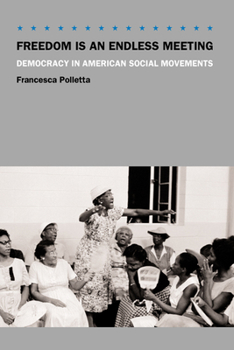Freedom is an Endless Meeting: Democracy in American Social Movements
Select Format
Select Condition 
Book Overview
Freedom Is an Endless Meeting offers vivid portraits of American experiments in participatory democracy throughout the twentieth century. Drawing on meticulous research and more than one hundred interviews with activists, Francesca Polletta challenges the conventional wisdom that participatory democracy is worthy in purpose but unworkable in practice. Instead, she shows that social movements have often used bottom-up decision making as a powerful...
Format:Hardcover
Language:English
ISBN:0226674487
ISBN13:9780226674483
Release Date:October 2002
Publisher:University of Chicago Press
Length:294 Pages
Weight:0.05 lbs.
Dimensions:0.9" x 6.0" x 9.0"
Customer Reviews
1 rating
excellent overview of participatory democracy in social movements
Published by Thriftbooks.com User , 17 years ago
This is simply one of my favorite books, all around, even including works of fiction. It's well written, well researched, insightful and relevant for activists in the trenches. The well written and relevant parts are, sadly, often not true of academic work on social movements. As for the well researched part, Polletta did an astounding amount of archival research and interviews with activists to write this book. What emerges is a fascinating history of how twentieth-century US progressive social movements have tried to implement participatory democracy in their own organizations. It is a chronicle of failed experiments, gradually historical learning and increasing success. By reading this book, we get to see what has worked and what has failed. Polletta makes two main contributions in this book. First, she rebutts those who argue that participatory democracy is a nice ideal, but impractical--that top-down leadership is a more efficient form of organization. On the contrary, says Polletta, participatory democracy promotes 1) solidarity in groups, because everyone feels included in the decision-making process and thus more committed to any plan of action; 2) innovation, as more people take part in the back and forth as new ideas are developed; and 3) personal development, as active participation in decision-making lets more people develop new skills, including leadership skills. The other major point Polletta makes is that it has been difficult for movement organizations to successfully implement participatory democracy because we have so few models of such interaction in mainstream society. Therefore, we often fall back on patterns of interaction we are familiar with--religious fellowship, friendship and the teacher-student relationship. In certain circumstances, these can work for a while, but historically they have always lead to trouble. We need to develop new models for relating to each other to make participatory democracy work. On the practical level, Polletta says that the contemporary community organizing and global justice movements have both developed good practices that seem to have solved many past historical problems--though in very different ways. (This is also not to say that they have solved all problems--new challenges certainly lie ahead.) On a more abstract level, Polletta points to the Latin-American ideal of the compañero/a, a relationship that is close, but based on the common bonds of political struggle, not modeled on friendship or kinship or some other familiar form. All in all, this is an excellent, though-provoking, inspiring book.





